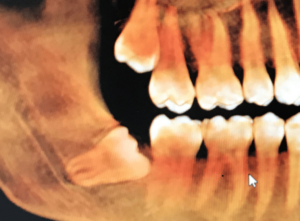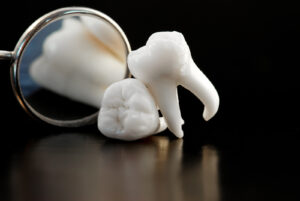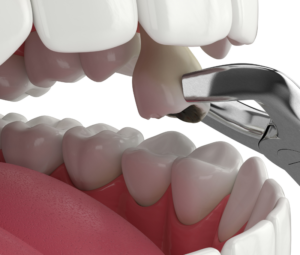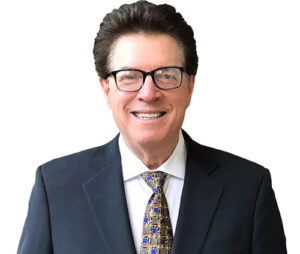One of the scariest parts about going to the dentist is the possibility of needing a tooth extraction. It’s safe to say that nobody wants to be in that kind of situation. Fortunately, tooth extractions in Westchester NY are safe because of the experience and skill of Dr. Andrew Greenberg, an oral and maxillofacial surgeon in Briarcliff Manor.
In addition to having confidence in your oral surgeon, learning about and understanding tooth extractions can help ease your fears.
What is tooth extraction?
Tooth extraction is the removal of a tooth from the jaw bone via simple or surgical procedure.
Tooth Extractions in Briarcliff, Mt. Kisco, & Yorktown Heights: Why do I need this procedure?
There are several reasons why a patient may need a tooth removed and you can rest assured that Dr. Greenberg will inform you about your need for tooth removal and will explain why extraction is necessary and recommend the best procedure.
-
Lack of Space
Teeth need space to grow and function properly inside the mouth. If your mouth lacks the space for other teeth, extracting a few will allow your remaining teeth to naturally fill the gaps and prevent overcrowding.
-
Wisdom Teeth
Perhaps the most common teeth that adults need to have extracted are wisdom teeth, which are molars in the very back of your mouth on both sides of the upper and lower jaw. Wisdom teeth can cause pain and damage neighboring teeth. They can also cause infection and cysts. Some people may have all four, two, or even none of their wisdom teeth. Unfortunately, some people don’t have room in their mouth for their wisdom teeth, which is why removing them is best.
Impacted wisdom teeth, which have not erupted from the gums yet, usually need to be removed through surgery. Wisdom teeth that have already come through the gums could be pulled, but these teeth have strong roots, so surgery is usually the best way to extract them.
-
Tooth Decay
Tooth decay can occur in any tooth if you fail to properly clean your teeth. Sugars and acids can quickly eat away your tooth enamel and cause cavities. If not treated in a timely manner, the tooth decay can spread to the pulp and root, making it less likely that your tooth can be saved.
-
Infection
An infection in any tooth can easily spread to other parts of the body if not treated immediately. Saving the tooth is possible if you seek treatment early enough, but if it gets to the point of no return, extracting the tooth is necessary.
-
Other Health Concerns
If you need to undergo chemotherapy or an organ transplant, any compromised teeth will have to be removed to prevent life-threatening infection.
How will Dr. Greenberg determine that I need a tooth extraction?
The best way for Dr. Greenberg to know if you need a tooth extraction is for him to thoroughly examine your teeth. The doctor will perform a visual inspection of your teeth. A panoramic x-ray will show Dr. Greenberg all of your teeth, including any wisdom teeth if you have any.
Tooth extraction is a last resort, so Dr. Greenberg will try to save your tooth if possible. This could include treatments as simple as a filling to a more complex treatment such as a root canal. A root canal involves the removal of deep decay. The tooth is then cleaned and a crown is placed on top.
A root canal that fails may require a procedure known as an apicoectomy, which is when the doctor removes the tip of the tooth at the end of the root and places a filling to seal it so the bone can regenerate around the root.
If Dr. Greenberg cannot save your tooth, your tooth he will recommend extraction.
What is the process for tooth extractions?
If you need a tooth extraction for any reason, Dr. Greenberg will discuss the situation with you and create a plan for extracting the tooth that works best for you and your needs. The type of extraction procedure you need all depends on the damage and decay in your tooth and whether the tooth is impacted or visible above the gum surface.
There are two procedures for extracting a tooth, and Dr. Greenberg wants you to know how each process works.
-
Simple
The simple procedure of tooth extraction is when a topical anesthetic is applied to the patient’s gums to numb the area around the tooth. An injection of a local anesthetic will ensure you don’t feel pain during the procedure. An elevator, a handheld tool positioned at the root tip, will loosen your tooth, and the doctor will pull it out using forceps.
-
Surgical
The surgical procedure is a little more complex, but there’s no need to worry. Dr. Greenberg has decades of experience removing teeth via surgery so you are in the best hands. He will begin by giving you a local anesthetic. IV Sedation will keep you calm and relaxed. You can even opt for general anesthesia so you are asleep and unaware throughout the entire procedure.
Dr. Greenberg will make a small cut into your gum and remove the tooth. Some bone from the jaw may need to be removed as well before the tooth can come out.
How long is recovery time after tooth extractions?
Typically, your oral surgeon will ask you to take it easy for at least 48 to 72 hours after surgery to allow the area to clot. Dr. Greenberg recommends a soft bland diet and plenty of water during this time and you should be able to return to normal activities afterward. The soft tissue will heal in about 3-4 weeks, so be careful about what you eat during that time and try to keep the area as clean as possible.
Contact Dr. Greenberg for tooth extractions in Westchester NY today!
Dr. Andrew Greenberg proudly serves Westchester County and surrounding communities in New York. If you need a tooth extraction, Dr. Greenberg has the experience and skills to provide you with the best treatment possible. Dr. Greenberg can even install a dental implant that will look and feel just like the tooth you had to have extracted. Other treatments are also available. To make an appointment, call our Briarcliff Manor office at 914-762-3388 or visit our website today!




